Shiny Things
By BOP Staff
August 8, 2008
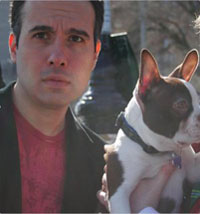 Medium Large
Medium Large
The comic pages suck.
Since the Holy Trinity (Calvin & Hobbes, The Far Side, Bloom County) left the funny pages, actual laughs have been few and far between, with most of the strips watered down for the consumption of eight-year-olds and grandmas. Oh sure, there's the odd Get Fuzzy or Pearls Before Swine, and Foxtrot still sticks around on Sundays, but when was the last time you laughed at Marmaduke, The Wizard of Id or Drabble, if you ever did? It's gotten to the point where existentialist parodies of Garfield are funnier than the real thing.
Surely these people, who are paid to be funny, can't be as bereft of ideas as it seems, can they? Is there no hope at all for comics? Turns out there is, and some of them are hiding wells of talent that they're not really permitted to share with the larger public, lest the comics editor get shocked letters and asking Rex Morgan MD to be brought back. Francesco Marciuliano is the current (but not original) writer of Sally Forth, one of the blandish family narrative comics that populates and clogs the comics page. However, that's really just his day job, and when let loose, can transcend the limitations of newspapers. The Evidence: Medium Large, his online four-panel comic strip that's a riotous, foul-mouthed rip on not just the sacred cows of comics (Peanuts, B.C. and others) and pop culture (breakfast cereal mascots, Dr. Seuss, superhero tropes) but full of brilliant and subversive ideas in its own right.
Medium Large recently returned from a lengthy hiatus, during which Marciuliano spent time writing for PBS children's series, plays and The Onion (the slacker), and now offers up five surrealist, high-concept strips a week. Explaining exactly why his comics are funny is an exercise in pedantry and doomed to fail, but with concepts like "Piglet & Eeyore: Vice Cops" and "Teen Girl President", it's really pretty self-explanatory. Either you like Medium Large's humor, or you wish Ziggy would stop being so edgy. And either way, you'll never look at your lemons the same way ever again. (Reagen Sulewski/BOP)
|
|
|
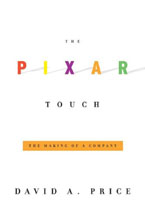 The Pixar Touch, by David A. Price
The Pixar Touch, by David A. Price
Pixar equals quality. We all know this to be true. And it's quite clear that most of the world believes it, too, as their worst performing film worldwide comes in at $358 million (we won't factor in WALL-E yet since it doesn't have international numbers for comparison). They have a slew of Oscar nominations and wins, both for their animated short films and feature length projects.
It wasn't always smooth sailing for Pixar, though. There was a time when it was uncertain they'd even be able to stay in business due to lack of capital. David A. Price's book, The Pixar Touch, does an outstanding job of chronicling the company's inauspicious beginnings as a small offshoot of a computer division within Lucasfilm (yes, George Lucas's company). Eventually, the company was purchased by Steve Jobs - during a time when he and Apple were at odds - and he conceived it as a software/hardware development company. Animation was simply something that was being done on the sly, though the leaders at the company truly envisioned a day when they would create a full-length animated feature.
Needless to say, they succeeded in that goal and since that time, Pixar has evolved to something much greater. The Pixar Touch takes readers through the early struggles, giving an interesting picture of the difficulties they faced and introducing us to the key players in the company's growth and development. We also learn much about the creative process for each of the movies to date (with the exclusion of WALL-E, as the book was published in advance of its theatrical release). Pixar devotees will appreciate the detail to be sure.
I will note that the first third of the book is quite technical, as that discussion primarily focuses on the hardware/software development aspect of Pixar and the work that was done during that time. There are also many, many names thrown around throughout the book and it can occasionally be difficult to keep all the characters straight. Nonetheless, once Price gets to the fireworks factory where John Lasseter begins having some success with his animated short films and Disney becomes involved in the creation of Toy Story, things really pick up and the book has a quick flow. I've greatly enjoyed learning more about the creative folks at this company and the movies I so dearly love. (Kim Hollis/BOP)
|
|
|
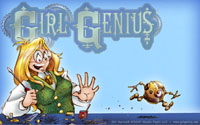 Girl Genius
Girl Genius
Would you like to lose 48 to 96 hours of your life?
You would?
Okay, go ahead and click this link.
The above link is the very first episode of Girl Genius. The comic is drawn and written by Phil and Kaja Foglio. It's a beautiful, funny, luscious and downright mesmerizing webcomic about a young girl named Agatha Heterodyne. The story is set in a Steampunk universe that is utterly amazing and gleefully bonkers at the same time.
Those of you who read this column with any sort of nerd credibility will definitely recognize the creators from their previous and well-documented tenures as artists for both Dragon magazine and Magic the Gathering. What you don't know about these two is that their talent for storytelling far exceeds their talent as artists, and these two are mighty fine artists. Recent storylines have included the creation of the ultimate coffee machine (It's PERFECT!), an assault on a major city by mechanized walkers repelled by a young man wielding lightning as a weapon, a sentient schizophrenic fortress kitchen and a pack of invulnerable warriors known as "Jaggers" that appear to have been in inspired equally by the three stooges and the three musketeers.
That's all occurred over the last six months. Keep in mind that this comic has updated like clockwork every Monday, Wednesday and Friday for the last five years. I don't think these two have ever missed an update, and in webcomics, that's an almost Lou Gehrig style record. And every update is available to you the viewing public, absolutely free.
I will warn you, however, that Girl Genius is not safe for work. It's not that there's any nudity, sex or horrific imagery, it's just that when you begin reading this strip, you will rapidly succumb to "just one more page" syndrome, and if you try doing that at work, you might not won't get much done. So wait until you get home, and then check it out.
Honestly, all I want for Christmas is for someone to option a Girl Genius script. It's just that good.
Oh, the heck with that. It's PERFECT! (Scott Lumley/BOP)
|
|
|
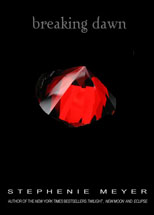 Breaking Dawn
Breaking Dawn
What began as a small, young adult series aimed primarily at teenage girls quickly spawned into the biggest thing to hit the book industry since, well, Harry Potter. It's the Twilight saga, which officially "ended" – I'll get to the quotations in a sec – with the mega midnight release of Breaking Dawn late last week (1.3 million sold in its first day alone). Dubbed as a clash between the romance novel and vampire lit, the Twilight saga chronicles the strange, teenage love affair between human Bella Swan and vampire Edward Cullen.
Throughout the series, it has been Bella's quest to not only "have" Edward (read: jump his bones AND be with him forever), but also to be fully immersed in the dangerous world of vampires by becoming one herself. Breaking Dawn supposedly satisfies both of these storylines that have kept readers' attention through three novels and brings the Bella-Edward story arc to a definitive close in this final chapter.
In Breaking Dawn, 18-year-old Bella is, for lack of a better term, hornier than ever before, which is ambitious of author Stephenie Meyer considering the demographic the series is presumably geared towards. Following Bella's sexual motivations outlined quite clearly from the onset, a series of devastating events begin unfolding with severe consequences. Even so, this one wraps up all nice and pretty like the grand majority of American lit, right? Right?! Well, you'll just have to give this great series – a personal guilty pleasure of mine – a try to find out for yourself.
There is, however, life after Breaking Dawn (ergo the quotation marks surrounding the word ended above). Meyer next has plans to publish Midnight Sun, which tells the same story as the series' opener, Twilight, but from Edward's perspective and not Bella's. Books following the events of Breaking Dawn could also be in the cards, though they would be set outside the perspectives of both Bella and Edward. (Eric Hughes/BOP)
|
|
|
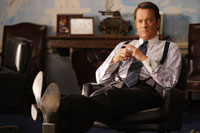 Charlie Wilson's War
Charlie Wilson's War
Aaron Sorkin fans unite!
Assuming you're not all already writing for BOP, those of you Sorkin fans who read the site every day and fall into this category should know that Charlie Wilson's War does not disappoint. The Academy Award nomination for Philip Seymour Hoffman probably should have been your big hint, but it's understandable if you thought he's rigged the vote by now. Of course, the fact that Tom Hanks didn't get one probably confused you. Don't worry. He was robbed.
Charlie Wilson's War was a box office disappointment, earning only $66.6 million domestically - a troubling number if you're religious - against a budget of $75 million. For a Tom Hanks film, this is a lackluster result, but you should heed the critics on this one. The Cold War biopic has a fresh rating of 83% on Rotten Tomatoes as well as 7.4 out of 10 at IMDb. Listen to your peers and heed my advice. It deserved a better fate.
For those of you who missed all of BOP's coverage of Charlie Wilson's War, here is what you need to know. The movie is set in the 1980s and explores the implausible but true story of an unheralded Texas congressman who somehow affects the greatest change of the decade. A lecherous partier (think Matt Leinart as a politician), the titular Wilson's story begins in a Las Vegas hot tub. As strippers join a Playmate of the Month in keeping him company, Wilson notices Dan Rather wearing a turban on a television across the room. Rather is investigating the plight of the Afghani people, who have lost thousands to Russian invaders. Wilson recklessly throws himself into the mix, deciding that he should lead a charge to do...something.
The lack of forethought in affecting political change in Afghanistan is the underlying point of Aaron Sorkin's script though the movie itself works independent of how you view the message. Tom Hanks offers one of his best performances to date, high praise given his track record, as a charming screw-up who is largely well intended but has bungled into pretty much everything good in his life. His comedic foil is Hoffman's character, Gust ("with a T") Avrakotos, a second generation Greek-American whose father sold soda pop. Like Wilson, Avrakotos is a working class man who has made a career for himself with the CIA. In the nation's capitol wherein so many people earn their power through underhanded deals and sycophancy, these two are Joe Sixpacks who are a bit bemused by the way their country's government operates. Once they formulate a plan to "shoot down Russian planes" in Afghanistan, they evolve from a strange political curiosity to historically impacting.
An exercise in economics is what proves to be the men's goal as well as the undoing of the Russians. If the defending army is properly militarized with the right weapons, the financial cost for the communists is outrageous. A few thousand dollars in munitions can allow for the systemic destruction of a $17 million Soviet plan. The problem is that when Wilson decides to impact foreign policy, the Afghani desk has only $5 million worth of revenue directed toward aid for the country. Even worse, weapons that destroy Russian equipment cannot come from the United States for, as Gust plainly states, "That is how a Cold War becomes a real one."
How the two men manage to avoid such World War III-esque ramifications while fundamentally changing the dynamics of the Middle East for the next two decades is what makes this movie engaging. The movie tracks the haphazard manner in which the Cold War is won, but it does so while focusing on a few eccentric characters. Key plot points involve a diehard conservative religious zealot billionaire who looks a lot like Julia Roberts, a team of aides colloquially named Charlie's Angels for their "assets", and an arms agreement made between bitter enemies during a belly-dancing performance. Clearly, this is a strange and marvelous story with one of the best casts in recent memory. It sparkles with the wit of Sorkin to a degree that (sadly) has not been seen in cinema since The American Present in 1995. Rare is the release that so cleverly finds a balance between intellectual drama and powerhouse entertainment; such is the accomplishment of Charlie Wilson's War. (David Mumpower/BOP)
|
|
|
|
|
|
|

